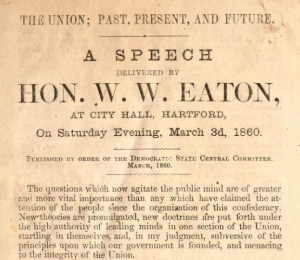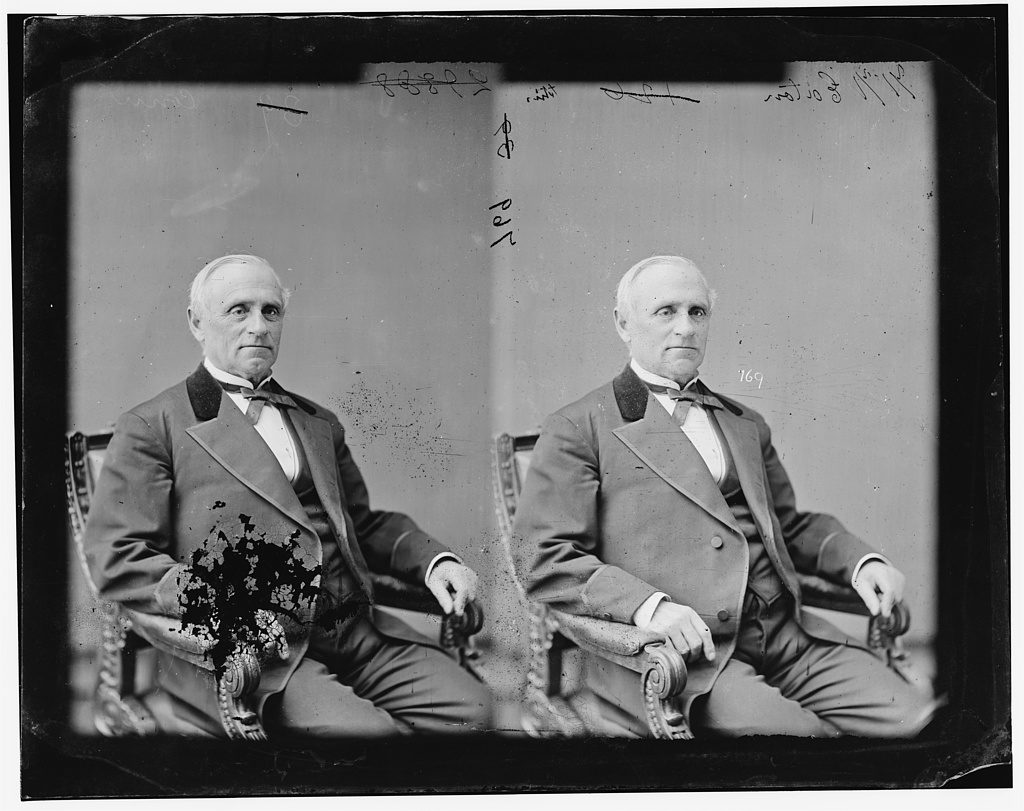By James Brown
Serving first as a member of the US Senate and later as a member of the US House of Representatives, William Wallace Eaton distinguished himself as a Connecticut politician during the mid-1800s. His federal service was preceded by several terms in the Connecticut General Assembly. Eaton’s most notable contribution to the history of Connecticut was the important role he played as a leader of the loyal Democrat opposition throughout the Civil War. In that capacity, Eaton consistently articulated the Jeffersonian view of the respective roles of the federal government and the states.
Tolland Native Launches Political Career
Born on October 11, 1816, Eaton grew up and attended school in Tolland. After several years in business in South Carolina, he returned to Connecticut and began practicing law in 1837. He was elected to represent Tolland in the Connecticut House of Representatives in 1847. He moved to Hartford in 1851, and during the next 25 years voters elected him to seven more terms in the Connecticut House. During two of these terms he served as Speaker. He was also elected to one term in the Connecticut Senate.
Though Eaton ran unsuccessfully for the US Senate in 1860, he was appointed to that position on an interim basis upon the death in 1875 of Senator (and former Civil War Governor) William Buckingham. Shortly thereafter, he was elected to a full six-year Senate term. During the later portion of that term, Eaton served as Chairman of the Senate Foreign Relations Committee. In his final successful campaign he was elected to the US House of Representatives in 1883. After losing the re-election race in 1884, he returned to practice law in Hartford.
Though Eaton’s extensive federal and state legislative service alone would have been a worthy legacy for any politician, his actions and words during the Civil War years mark his best-remembered contribution to Connecticut’s history.

The Union, Past, Present, and Future a Speech Delivered at City Hall, Hartford, on Saturday Evening, March 3d, 1860 by William W. Eaton
Eaton Leads Opposition to War
In 1860, Eaton consistently and inflexibly presented the Jeffersonian views of Connecticut’s Peace Democrats. Eaton’s position on the secession issue and on the possibility of war presented a stark, antagonistic contrast to Governor William Buckingham’s stance. Buckingham argued that when the states ratified the Constitution, they surrendered their sovereignty and any right to secede from the union. In contrast, Eaton believed that when the states ratified the Constitution, they voluntarily chose to coexist within the framework of a republic and had not surrendered their sovereignty. Eaton noted that though slavery was “the most vexing and disturbing” issue presented during the Constitutional Convention in 1787, it was handled without rancor:
There was in the Convention a strong anti-slavery feeling; likewise, a powerful interest in favor of the institution, and yet the matter was adjusted at that time, as it must be and will be at this time, by utterly ignoring the moral view of the question, and regarding only its political character, so far as the Constitution of the United States is concerned, permitting the States individually in their sovereign capacity to determine as to the morality of the institution, and to establish it or reject it at their option.
Eaton expanded on his view of states’ rights in March of 1861:
It is heresy to say that allegiance is due to the government of the United States. No such allegiance as that is demanded by your oath as freemen. Your allegiance is due to the sovereign State of Connecticut. … The proudest epitaph that can be written on the tomb of any man here will be that he belonged to that gallant band of the democracy who in 1861 struck down foul principles of abolition.
Early in the conflict, while voluntary troops were being raised in Connecticut, Eaton said this when he learned of similar activity across the border: “If the soldiers of Massachusetts try to pass through this state to fight their brothers in the South, they will have to pass over my dead body.”
Eaton addressed the Democratic State Convention in February 1863, one month before Congress passed the first Federal Conscription Act. Eaton’s thoughts about the draft were consistent with his views on the war in general: “Is any man so low as to be loyal to any man – to Abraham Lincoln, the accidental President? The Democrats of Connecticut will not sustain a war waged for the destruction of the Union. We will tell Lincoln that he cannot come into Connecticut and take men from their homes, that he cannot come into Connecticut and compel men to serve in the army.” In its report of the Convention, the Republican-championing Hartford Courant characterized Eaton’s speech as a “shameless abuse and misrepresentation of the Administration, a determination to resist its authority, with nary a word against the rebels, or the wickedness of the rebellion.”
Upon Eaton’s death some 35 years later on September 21, 1898, there was no sign of such political heat. The Courant reported on his funeral service, quoting Rev. E. P. Parker as having said, “His record was not stained by personal vices or personal enmities. He was incapable of inconsistency of purpose….The warrior spirit was strong in him, but he was ever an honorable and chivalric foe. If I were to tell the story of his life, ‘Honor’ would be the subject of my story.”
James Brown is a corporate attorney working towards a Masters degree in History at Central Connecticut State University









